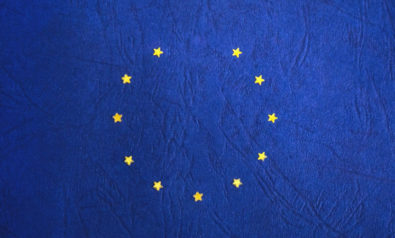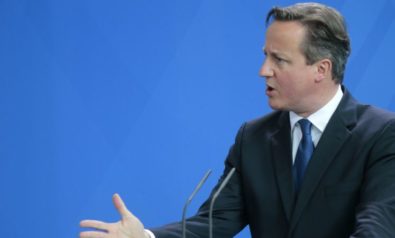The implications of a Brexit—for the EU as well as the UK—are important and overwhelmingly negative.
The battle-lines have been drawn. Having “renegotiated” the terms of the United Kingdom’s membership of the European Union (EU), Prime Minister David Cameron has called a referendum on June 23 giving voters a say on whether the country should remain in or leave the EU.
With Cameron campaigning to stay in the EU—a position opposed by a large, perhaps majority, of his Conservative Party and most of the UK’s mass-circulation tabloid newspapers—the outcome is uncertain.
How did we get to Brexit?
The UK was a latecomer to the EU. The English Channel, that thin stretch of water, no more than 32 kilometers wide at its narrowest point, has enabled the country to avoid foreign invasion and occupation for almost 1,000 years. Historically, the UK steered clear of deep and permanent engagement on the European mainland, intervening primarily when, as in the cases of Napoleonic France and imperial and Nazi Germany, a single power threatened to achieve hegemonic control of continental Europe.
Following the Second World War, closely allied with the United States and at the hub of the (British) Commonwealth, the UK aspired to play a world role as an independent state. It initially stayed out of both the European Coal and Steel Community (ECSC), founded in 1950, and the European Economic Community (EEC), launched in 1957. By the time it changed its mind, for economic reasons, in the 1960s, French President Charles de Gaulle was in power and twice vetoed British entry.
When the UK finally entered the EU, after de Gaulle stepped down, in 1973, it remained an ambivalent member. A new Labour Party government renegotiated the UK’s accession terms in 1974-75 and called a popular referendum that produced a two-to-one majority in favor of staying in. The UK’s relations with the EU nonetheless remained fraught, as illustrated by the decade-long conflict over its contribution to the EU budget (resolved at an historic summit at Fontainebleau in 1984).
Following the end of the Cold War, as the rest of the EU began to forge closer political integration, the UK increasingly became a semi-detached member. It opted out of the euro, the (borderless) Schengen Area and—initially—the social policy provisions of the Maastricht Treaty. In 1992, the pound was unceremoniously ejected from the European Monetary System (EMS), which it had entered only in 1989—an event that the Conservative government of the time experienced as a brutal humiliation (such that the chancellor of the exchequer who supported EMS entry in the late 1980s, Nigel Lawson, has meanwhile become a leading advocate of Brexit).
The political drivers
In the last 25 years, euroskepticism changed political camps in the UK. While Labour, which had proposed to leave the EU in the early 1980s, became more “pro-European,” the Conservatives, who had overwhelmingly supported EU accession in the 1970s, grew increasingly hostile. Along with the rise of the fiercely “anti-European” UK Independence Party (UKIP), the growth of euroskepticism in the Conservative Party persuaded Cameron to pledge a (second) referendum on EU membership if his party won a majority at the 2015 General Election—which, against all expectations, he did.
The outcome of the referendum is currently very uncertain. Most polls point to a fairly narrow victory for staying in, but no more than half of British voters have made up their mind how they will vote; so the course of the campaign will determine the result. The fact that Cameron is still in the early stage of the new British Parliament, and that he and the other leaders of the “stay-in” camp are more popular and credible than their opponents in the Brexit camp, will work in his favor. Cameron and his allies can also anticipate useful support from business organizations and companies that will emphasize the likely negative impact of Brexit on the British economy and labor market.
The Brexit camp, for its part, will count on backing from most of the UK’s mass-circulation tabloid newspapers as well as UKIP and many Conservative Party activists. It will hope that events in the EU, such as a possible new crisis over Greece in the eurozone or a continuation or intensification of the refugee crisis, will further damage the European Union’s image in the UK and boost the support for Brexit.
What if…
The implications of Brexit are major. The UK would not fall off an economic cliff overnight. If it should occur, over the next two years or more, the British government would have to negotiate the terms of access of British-based firms to (the remainder of) the single EU market. However, given the imbalance of economic power between the two sides, these terms would almost certainly be less favorable than British firms currently enjoy. At the same time, the UK would also have to renegotiate the terms of access for British companies to non-EU markets. Firms would in any case face a prolonged period of uncertainty. Some would have an incentive to recalibrate their operations as between the UK and the rest of the EU.
 For the UK, the political implications of Brexit would likely be even more explosive than the economic. As a majority of Scots will almost certainly vote to remain in the EU, the Scottish National Party would insist on a fresh referendum on Scottish independence—which this time it would have a very good chance of winning. The UK would likely break up.
For the UK, the political implications of Brexit would likely be even more explosive than the economic. As a majority of Scots will almost certainly vote to remain in the EU, the Scottish National Party would insist on a fresh referendum on Scottish independence—which this time it would have a very good chance of winning. The UK would likely break up.
For the remainder of the EU, the fallout from Brexit could also be very damaging. In a world in which Europe’s demographic, economic, financial, military and diplomatic weight is already in decline, it would lose its second-most populous member, its second-largest economy and, measured by expenditure, its principal military power. Brexit would alarm the EU’s allies around the world, led by the US, which is unequivocal in its support for continued UK membership of the EU. But it would comfort the EU’s rivals, first and foremost Vladimir Putin’s Russia.
Brexit would also represent the hitherto most tangible manifestation of European disintegration. It would strengthen the already strong and growing centrifugal tendencies in the EU and risk unleashing a chain-reaction that could culminate in other member states deciding to leave. At the end of this road, in the worst-case scenario, could lie the collapse of the euro, the fragmentation of the European market, a much weaker Europe in the world, and less peaceful international relations in Europe.
The stakes of the Brexit referendum are, in a word, immense.
*[This article was originally published by INSEAD Knowledge, a partner institution of Fair Observer. Copyright 2016 INSEAD Knowledge.]
The views expressed in this article are the author’s own and do not necessarily reflect Fair Observer’s editorial policy.
Photo Credit: 360b / Shutterstock.com
 We bring you perspectives from around the world. Help us to inform and educate. Your donation is tax-deductible. Join over 400 people to become a donor or you could choose to be a sponsor.
We bring you perspectives from around the world. Help us to inform and educate. Your donation is tax-deductible. Join over 400 people to become a donor or you could choose to be a sponsor.
Support Fair Observer
We rely on your support for our independence, diversity and quality.
For more than 10 years, Fair Observer has been free, fair and independent. No billionaire owns us, no advertisers control us. We are a reader-supported nonprofit. Unlike many other publications, we keep our content free for readers regardless of where they live or whether they can afford to pay. We have no paywalls and no ads.
In the post-truth era of fake news, echo chambers and filter bubbles, we publish a plurality of perspectives from around the world. Anyone can publish with us, but everyone goes through a rigorous editorial process. So, you get fact-checked, well-reasoned content instead of noise.
We publish 2,500+ voices from 90+ countries. We also conduct education and training programs
on subjects ranging from digital media and journalism to writing and critical thinking. This
doesn’t come cheap. Servers, editors, trainers and web developers cost
money.
Please consider supporting us on a regular basis as a recurring donor or a
sustaining member.
Will you support FO’s journalism?
We rely on your support for our independence, diversity and quality.

































